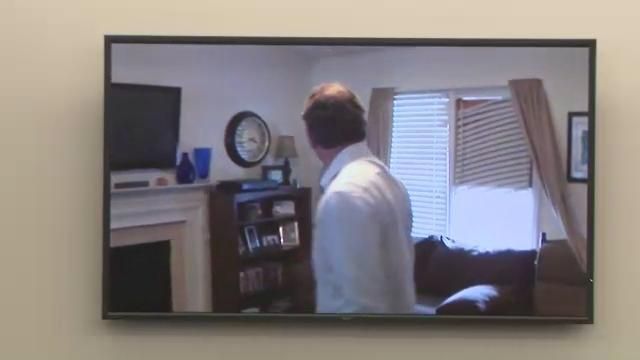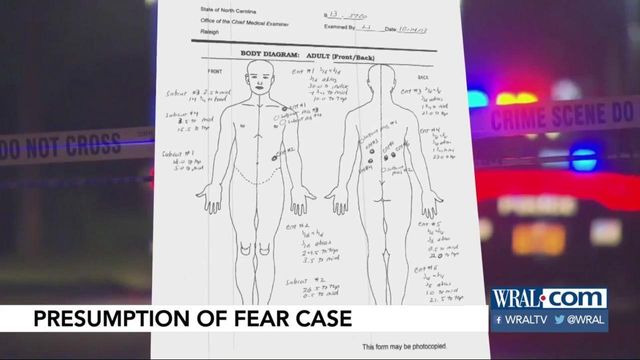Video: Rev. Pat Chisenhall testifies about shooting his son-in-law to death
Noon Thursday update: The Rev. Pat Chisenhall is testifying Thursday in the wrongful-death lawsuit filed against him by the parents of his son-in-law, whom Chisenhall shot to death in 2013.
Chisenhall says he shot Christian Griggs in self-defense as Griggs was breaking into his home.
At the beginning of his testimony, jurors were shown a video taken by the Harnett County Sheriff's Office of Chisenhall explaining his recollection of the events that led up to the shooting.
Previously:
Two key witnesses Wednesday recounted the lead-up and aftermath of the 2013 shooting of Christian Griggs by his father-in-law, an Angier pastor, in a wrongful death suit that will test the protections of the state's Castle Doctrine.
Before emotional testimony from the slain 23-year-old's father, a state medical examiner testified that she believes Christian Griggs was likely bent over or prone when he was shot four times in the back by the Rev. Pat Chisenhall, who leads the Abundant Life Worship Center in Harnett County.
Associate Chief Medical Examiner Dr. Lauren Scott, who performed Griggs' autopsy, told a Harnett County jury in the trial of a wrongful death lawsuit against Chisenhall that two of the wounds in his back would have been fatal.
Chisenhall shot Griggs six times at his home in Angier. No charges were filed against Chisenhall, who said he was defending himself and his daughter from her estranged husband as he attempted to break into the house. Chisenhall said he shot Griggs as he was coming through the front window of his home.
Griggs' family disputes those claims, saying Griggs was at the house to pick up his then 4-year-old daughter for scheduled visitation the day he was killed on Oct. 12, 2013. They filed the wrongful death lawsuit against Chisenhall in 2015, prompting a civil trial that began this week.
The case was the subject of a WRAL News investigation published and aired last week.
Scott told the jury that the trajectory of the four shots to Griggs' back – which entered at upward angles – meant that the upper half of Griggs body would have to be almost parallel to the ground. That's assuming the shooter was in a standing position, she said. She also testified that she had seen no evidence to suggest Chisenhall was crouching when he fired the shots.
Robert Levin, Chisenhall's attorney, pushed back against Scott's opinion of the body position, noting that the medical examiner had to rely on information she received from law enforcement, in addition to her autopsy, to form that conclusion.
Under questioning, Scott said it was possible Griggs could have been facing the shooter with the top half of his body twisted away, rather than with his back to him. In that scenario, she said the top half of Griggs' body would still have to be close to parallel to the floor.
The jury did not hear a statement from Scott's 2015 sworn affidavit that the position of the body was "generally inconsistent with a claim of self-defense." That conclusion, Levin successfully argued to presiding Judge Beecher Gray before the trial, should be barred because it's outside the scope of Scott's job responsibilities and expertise.

Father addresses jury
The day was also marked by often emotional testimony from Anthony Griggs, Christian Griggs' father. He described Christian's early life, the beginning of his relationship with Katie Chisenhall, his son's deployment to Iraq and the day he found him shot on Chisenhall's porch. At one point, the court had to break and excuse jurors when Dolly Griggs, Christian Griggs' mother, broke down in tears in her seat behind her lawyers.
Anthony Griggs recounted how Christian Griggs and Katie Chisenhall first started dating while students at Harnett Central High School. Griggs said he believed his son's new girlfriend was a bad influence on Christian, causing him to neglect his schoolwork and act up at home.
"It seemed like Katie had become the focus of his attention," Griggs said.
He said they sent their son to the Patterson School, a boarding school in Lenoir, N.C., to change Christian's surroundings and refocus him.
Christian Griggs and Katie had a child shortly after graduating high school in 2008.
Tensions mounted at home shortly after Christian Griggs withdrew from college at North Carolina State University, where he was attending on an ROTC scholarship. Law enforcement responded to a fight between Christian and Anthony Griggs at their Angier home, an encounter that prompted his son to spend the night in a county jail.
Griggs said his son wasn't violent during the incident.
But on cross-examination, Chisenhall's lawyer repeatedly challenged that testimony. Citing police reports that noted Christian Griggs had put holes in the walls, damaged property at the home and had to be subdued by his father and Tased by law enforcement, attorney Robert Levin pointed to a portion of the reports that said Griggs had threatened to kill everyone in the house.
"That's not what I told the police," Anthony Griggs responded. "That's what the police wrote."
He also denied statements in the police report that responding officers had advised him to seek mental health treatment for his then 18-year-old son. Christian Griggs was a teenager with a new baby, his father said, and was lashing out under pressure.
He and Katie Chisenhall were married in January 2009 in a ceremony officiated by her father, the Rev. Pat Chisenhall. Anthony Griggs said he and his wife weren't invited and had concerns about the wedding given their son's age and financial situation.
"They flat out were not ready for marriage," Griggs said.
The jury also heard details about Christian Griggs' deployment to Iraq, during which his convoy suffered an attack from an improvised explosive device that killed two of his fellow soldiers. Anthony Griggs said his son was not physically hurt, but he eventually learned of problems with anxiety and trouble sleeping.
Katie and Christian Griggs separated in the fall of 2013 after a rocky relationship Anthony Griggs described as "tumultuous," but not until after several other incidents where police were called.
On cross examination, Chisenhall's attorney repeatedly challenged Anthony Griggs' earlier testimony to the jury on what he knew about those incidents, including one the night before the shooting that resulted in misdemeanor warrants Katie swore out against his son for breaking and entering, property damage and domestic criminal trespass.
Anthony Griggs had said Christian didn't say anything about any such an altercation with his estranged wife. But Levin introduced police notes from the day of the shooting – initialed by Anthony – that said his son had tried to pick up his daughter the night before in an incident that ended in a call to law enforcement.
Griggs said he must have heard that from someone else at the time, and maintained his son hadn't told him about what happened. And he said he wasn't sure why he initialed, adding he conducted the interview with investigators right after he learned his son had died.
"It was a time of great chaos," Anthony Griggs said.
Cross-examination will continue Thursday morning.
Opening statements begin the day
At the center of the case is North Carolina's Castle Doctrine, which allows lawful occupants of homes, vehicles and workplaces to defend themselves and their property. A North Carolina law passed in 2011 inscribed the doctrine explicitly in state statute, adding that the occupant of those places has an automatic "presumption of fear" that must be rebutted by the other side – the state in criminal cases, or the plaintiffs in civil cases.
Delivering the opening statement for the Griggs family, attorney Rebecca Ugolick emphasized that the case is not an attack on the Castle Doctrine.
"I am not asking you to say it's not OK to defend yourself. I am not asking you to say it's not OK to defend your family. I am not asking you to say it's not OK to defend your home," Ugolick said. "What I'm asking you to do is say it's wrong to shoot a wounded, unarmed man in the back four separate times."
Levin, the attorney representing Pat Chisenhall, said they planned to present evidence showing Griggs had communicated clear threats to both Chisenhall and his daughter, Katie, making him fearful for his life.
"Pat Chisenhall, we submit the evidence will show, was defending his life, was defending his daughter's life at the time of this unfortunate incident," Levin said. "You have to decide if he was acting in self defense."
The Griggs family is seeking compensatory damages in the case, but ahead of the trial's opening day dropped their original claim for punitive damages of more than $250,000.
The trial is expected to last through early next week.












